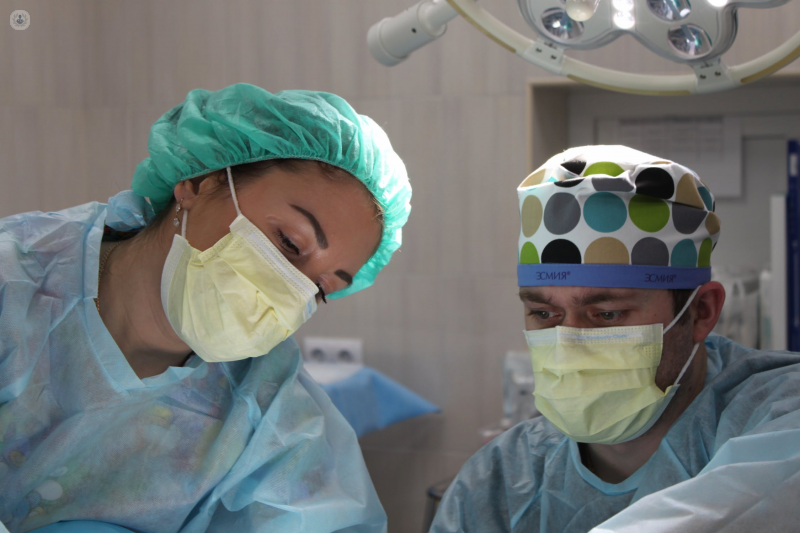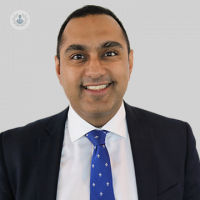How should I prepare for my sinus surgery operation?
Escrito por:Sinus surgery might sound scary but after a thorough, in-depth consultation prior to sinus surgery, there is very little chance of any complications. Thankfully sinus surgery is quite successful in an experienced surgeon’s hands. Mr Raj Lakhani walks us through what’s involved with a sinus surgery operation and what you can expect after.

Preparing for the operation
After the nose and sinus drainage pathways have been evaluated using a narrow telescope, and after patients have tried numerous treatments for their nose, including nose sprays and washes, surgery will be carried out. If the patient is taking blood thinners, these will be stopped prior to the operation to decrease the risk of bleeding after surgery. Any medical sprays and washes can continue to be used until the operation.
Occasionally, patients might be given a course of medication to decrease the size of polyps to allow the surgeon to access the sinuses more easily during surgery and to decrease bleeding. Apart from that, a balanced diet and good hydration are recommended.
What does the operation involve?
Sinus surgery is a minimally invasive procedure. There are no cuts made from the outside. Surgery is conducted through the nostrils, which allows easy access to the sinus drainage pathways and the sinuses themselves. Usually, the surgery is performed under general anaesthetic, which means the patient will be fully asleep and the whole operation takes about one to two hours.
The surgery involves removing any polyps that might be obstructing the patient’s breathing or lessening their sense of smell. Any inflamed tissue or infection is cleared up and the drainage pathways are widened to improve airflow through the nose and to facilitate the delivery of medication after surgery. Rarely sinus surgery is performed with the patient awake using new technology in the form of balloon catheters which can be gently inserted into the drainage pathways to widen them.
You'll need about seven days off work. Although, you can start working from home if that's an option three to four days after surgery. Flying is limited to ten days after surgery.
What happens immediately after a sinus surgery operation?
After the operation, the patient is moved to a recovery area to be monitored until they are stable enough to go back to their room on the ward. From here, a nurse will check in on the patient periodically and give them something to eat. Surgery is normally a day-case procedure, as long as there is someone to pick the patient up after the surgery.
Pain is usually minimal following surgery, any pain following surgery thereafter can be controlled with painkillers like paracetamol or ibuprofen. In case the pain does get worse, the patient will be given some stronger painkillers when they are sent home.
Mr Lakhani gives patients medication to start taking the day after their surgery. This is generally in the form of salt washes which can be used twice a day. The salt washes can clean away any blood or mucus in the nose. Patients will also be given a steroid treatment to apply to the nose in the form of a spray or drops, which can also be started the day after surgery.
Are there risks to sinus surgery?
Large bleeds after surgery are thankfully rare, but oozing from the nose after surgery is common and this usually settles after a couple of days. Infection is very rare and antibiotics are not commonly used after surgery.
There is a small chance of developing scar tissue within the nose. This is often not problematic and causes no symptoms. Other risks include the potential for adverse effects to your sense of smell. On the whole, sinus surgery is extremely safe and all these risks will be discussed with the patient prior to surgery.
How should I look after my nose afterwards?
You can start nasal washes the morning after your surgery. This helps clear mucus and blood which may have collected and dried in the nose to help you breathe better and recover more quickly. Steroid treatment in the form of sprays or drops can also be applied.
Rest is essential. It’s important not to exert yourself too much as coughing, straining or heavy lifting may cause you to have a bleed after surgery, which is particularly the case three to four days after surgery. For the first two weeks, exercise is not recommended, after which you can gradually return to exercise up to four weeks after the operation.
Will there be any follow-up appointments?
Mr Raj Lakhani typically sees patients around four weeks after surgery. This allows time for the swelling in the lining of the nose to settle and for the nose to start opening up and functioning normally. It also allows time for the medication that the patient has been given after surgery to take effect. Symptoms will be reviewed in follow up appointments and the inside of the nose will be examined using a fibre-optic camera to ensure that recovery is proceeding as expected.
If there are any issues prior to your follow up appointment, it’s recommended that you contact your doctor, whether by email or telephone, however, a physical appointment is the best to ensure that your concerns are addressed.
For more information regarding sinus surgery, contact Mr Raj Lakhani.


